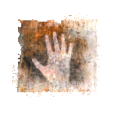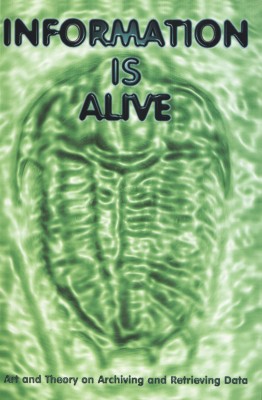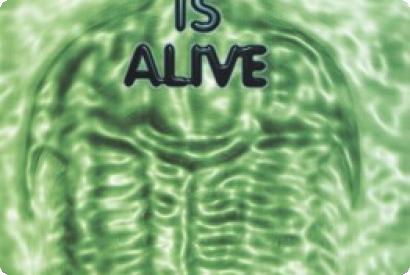Please wait a few moments while we process your request

Information is Alive
Information is alive : art and theory on archiving and retrieving data. — Edited by Joke Brouwer and Arjen Mulder. — Rotterdam : V2_Organization, Institute for the Unstable Media : NAI Publishers, 2003. — 216 p. — ISBN 9056623109.
Book published for the exhibition DEAF03 Dutch Electronic Art Festival: Data Knitting, V2_Organization, Institute for the Unstable Media, Rotterdam, the Netherlands, February 25 to March 9, 2003, organizers: Joke Brouwer and Arjen Mulder.
Participating artists:
George Legrady, Ari Versluis, Ellie Uyttenbroek, Herwig Weiser, Yasuhiro Suzuki, Simon Conway Morris, Jonah Brucker Cohen, Margarete Jahrmann, Max Moswitzer, Winy Maas, Tamàs Szakal, Josh On et Futurefarmers, Jeffrey Shaw, Lev Manovich, Stahl Stenslie, Asbjorn Flo, Knut Skagen, Trono Lossius, Geert, Mul, George Legrady, Ari Versluis, Ellie Uyttenbroek, Blast Theory, Volker Morawe, Tilmann Reiff, Lynn Hershman, David Link.
This ninth edition of the DEAF festival showcases media installations, works designed for the Internet, virtual models of real-time systems, and critical video games that propose new means of representing information. With help from data taken from various sources (thematic databases, official statistics) or left behind by visitors who have interacted with the works, the participating artists are able to map biological, social and political phenomena.
This publication is a critical tool for understanding the theoretical issues raised by each project exhibited. The book includes biographical notes on the participating artists accompanied by photo reproductions of the projects, essays as well as interviews with theorists. The guest authors delve into a variety of concerns with each attempting to define the ethical and political issues surrounding new methods of storing and disseminating information (database, Internet) that reshape the traditional notion of an archive (the term is used here in its broadest sense).
Manuel Delanda draws on Michel Foucault's theories to comment on the stranglehold some institutions exerts on individuals, who are seeing aspects of their identity sealed into electronic files. Arjun Appadurai reports on the desire to form collective memory as expressed, for example, through the official discourse on archives. He's interested in alternative ways to form this memory that subjects ignored by world capitalism are putting into place. In a mediation on various theoretical perspectives, Sadie Plant looks at cellphone use as a social bond in communities whose members are dispersed geographically (Filipino immigrants working abroad, for example). Artist Ingo Günther presents Worldprocessor (1988-2003), a project that proposes interfaces for visualizing statistical data related to global geopolitical phenomena (life expectancy, immigration rates, energy consumption). Through a philosophical reflection on the concept of movement, Brian Massumi evokes the paradoxical nature of information, which is both rooted in abstract systems (language, computer code) and understood subjectively when it is physically deployed. Boris Groys discusses how the carrier of media artifacts is overshadowed when an information value is attributed to these artifacts. In the form of a travelogue, Ryszard Kapuscinski relates his field experience in Itang, Ethiopia, and shows that the Western means of commemorating the effects of war and repressive social policies have been ineffective in this region. The publication also includes interviews by Joke Brouwer and Arjen Mulder with researchers working in different scientific fields (Simon Conway Morris : biology, George Dyson : epistemology, Winy Mass of the collective MVRDV : architecture, Antonio Damasio : neurology, and Scott Lash : sociology). These specialists comment on procedures used to sort and interpret the data gathered in their research.
Book published for the exhibition DEAF03 Dutch Electronic Art Festival: Data Knitting, V2_Organization, Institute for the Unstable Media, Rotterdam, the Netherlands, February 25 to March 9, 2003, organizers: Joke Brouwer and Arjen Mulder.
Participating artists:
George Legrady, Ari Versluis, Ellie Uyttenbroek, Herwig Weiser, Yasuhiro Suzuki, Simon Conway Morris, Jonah Brucker Cohen, Margarete Jahrmann, Max Moswitzer, Winy Maas, Tamàs Szakal, Josh On et Futurefarmers, Jeffrey Shaw, Lev Manovich, Stahl Stenslie, Asbjorn Flo, Knut Skagen, Trono Lossius, Geert, Mul, George Legrady, Ari Versluis, Ellie Uyttenbroek, Blast Theory, Volker Morawe, Tilmann Reiff, Lynn Hershman, David Link.
This ninth edition of the DEAF festival showcases media installations, works designed for the Internet, virtual models of real-time systems, and critical video games that propose new means of representing information. With help from data taken from various sources (thematic databases, official statistics) or left behind by visitors who have interacted with the works, the participating artists are able to map biological, social and political phenomena.
This publication is a critical tool for understanding the theoretical issues raised by each project exhibited. The book includes biographical notes on the participating artists accompanied by photo reproductions of the projects, essays as well as interviews with theorists. The guest authors delve into a variety of concerns with each attempting to define the ethical and political issues surrounding new methods of storing and disseminating information (database, Internet) that reshape the traditional notion of an archive (the term is used here in its broadest sense).
Manuel Delanda draws on Michel Foucault's theories to comment on the stranglehold some institutions exerts on individuals, who are seeing aspects of their identity sealed into electronic files. Arjun Appadurai reports on the desire to form collective memory as expressed, for example, through the official discourse on archives. He's interested in alternative ways to form this memory that subjects ignored by world capitalism are putting into place. In a mediation on various theoretical perspectives, Sadie Plant looks at cellphone use as a social bond in communities whose members are dispersed geographically (Filipino immigrants working abroad, for example). Artist Ingo Günther presents Worldprocessor (1988-2003), a project that proposes interfaces for visualizing statistical data related to global geopolitical phenomena (life expectancy, immigration rates, energy consumption). Through a philosophical reflection on the concept of movement, Brian Massumi evokes the paradoxical nature of information, which is both rooted in abstract systems (language, computer code) and understood subjectively when it is physically deployed. Boris Groys discusses how the carrier of media artifacts is overshadowed when an information value is attributed to these artifacts. In the form of a travelogue, Ryszard Kapuscinski relates his field experience in Itang, Ethiopia, and shows that the Western means of commemorating the effects of war and repressive social policies have been ineffective in this region. The publication also includes interviews by Joke Brouwer and Arjen Mulder with researchers working in different scientific fields (Simon Conway Morris : biology, George Dyson : epistemology, Winy Mass of the collective MVRDV : architecture, Antonio Damasio : neurology, and Scott Lash : sociology). These specialists comment on procedures used to sort and interpret the data gathered in their research.
Vincent Bonin © 2003 FDL



